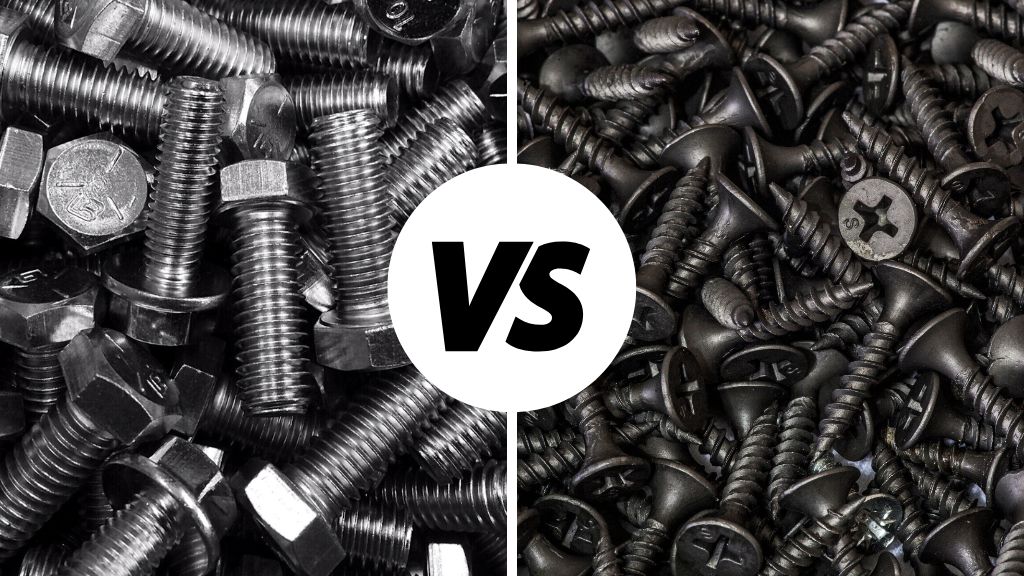
Bolts and screws are often looked at as identical fastening hardware. However, even if they look the same, they are different fasteners that are used for different applications. So, what is the difference between bolts and screws?
According to the Machinery’s Handbook, bolts are effective for assembling unthreaded objects, usually with a nut. Screws, on the other hand, are effective for assembling threaded objects. However, there’s a catch. When it comes to screws, not every object that uses them has threads.
While having threads, others create a thread while the screw is being installed. Ergo, the basic difference between bolts and screws is the former is used to piece together unthreaded objects and the latter is used to piece together threaded objects. Let’s get deeper into the differentiating factors.
Understanding Bolts vs Screws: Uses & Differences
Bolts
Bolts offer superior holding strength as compared to screws and other fastening hardware. Because of the threads, bolts have unparalleled holding power. They do need a washer or a nut for their installation. A washer spreads the load over a large surface area, reducing the wear and tear at the same time preventing the loosening of the bolt over time. While the nut fastens the bolt in place.
Bolts come in various sizes and types such as
- arbor bolts
- anchor bolts
- hanger bolts
- elevator bolts
- J bolts
- hex bolts
- rock bolts
- lag bolts
- U bolts
- shoulder bolts
They are made of materials such as steel, stainless steel, brass, bronze, and nylon. But, 90 percent of the bolts are made from steel and they are usually used on concrete and wood.
Generally, a pneumatic or a handheld wrench is used to install or remove a bolt. As opposed to screws, bolts are easy to remove. A pneumatic wrench offers more torque as compared to a handheld wrench and makes the installation or the removal process much easier and faster.
Screws
A screw is versatile fastening hardware, making it a favourite choice of manufacturers. They provide a good grip due to their threads and are a great companion for DIY projects.
There are various types of screws such as particle board,
- chipboard screws
- drive screws
- deck screws
- eye screws
- hammer drive screws
- wood screws
- drywall screws
- twin fast screws
- sheet metal screws
- security head screws
They also have diverse head shapes such as button, pan, mushroom, round, bulge, oval, flanged, and cheese, and they are made out of various materials. Undoubtedly, screws come in various sizes as well and they are primarily used on metal, wood, drywall, and sometimes even on concrete.
Generally, screws are made to be self-tapping, but drilling a pilot hole is a great way to ensure a good grip. Drilling pilot holes at once can save you a lot of time as you don’t have to change your drill bit constantly. Also, using a cordless drill provides better results and makes the installation and removal process easier and faster.
After the difference between bolt and screw, let’s move on to how to decide which one to choose for your next project.
How to Choose a Bolt or Screw for Usage?
If you are working on your DIY project and want to choose between a bolt and a screw, take these points into consideration:
Application
Your project is the key factor when it comes to choosing bolts and screws. Before starting one thing to keep in mind is the holding strength. Bolts offer superior holding strength, whereas screws offer adequate holding power. If you are working on projects like farming or fencing that need light to medium holding power then screws are the right choice. And for heavy-duty projects, bolts are the best. Bolts are ideal for finished projects that need to be assembled or disassembled.
Material
The materials you choose for your projects also become a factor in choosing a bolt or a screw. If you are working with pressboard, plywood, sheet metal, drywall, and deck planks, a screw is a perfect alternative. If you are working with studs, concrete, or beams, bolts are the right choice.
There are materials that could work with both bolts and screws. Ensure that you understand the amount of load you are going to put on the fastener. Here understanding the difference between bolt and screw comes into play.
Cost
Whenever you are working on a project, pricing is one of the most important factors, especially if you need a lot of fasteners. Bolts can be pricey, but they provide excellent holding strength, which is good for the long run. In case you need repairs on a project, choosing the wrong fastener while applying can cost you money instead of saving it.
The Bottomline
In this guide we tackled the question, what is the difference between screw and bolt. And we hope that it would help you in spotting the difference between bolts and screws the next time you work on a project. Finally, choose the fastener as per the application, material, and budget.






